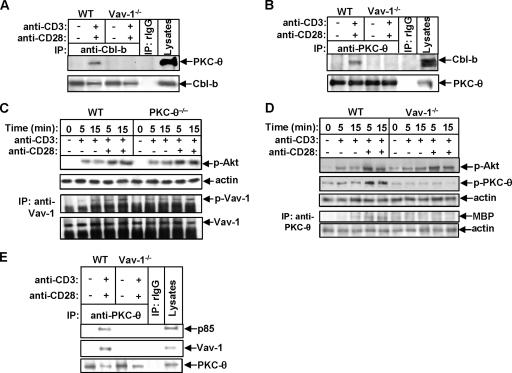FIG. 3.
Inhibition of TCR-induced PKC-θ activation by Cbl-b requires PI3-K and Vav-1. (A) WT and Vav-1−/− T cells were stimulated with anti-CD3 and anti-CD28 Abs for 15 min and lysed in 0.5% NP-40 lysis buffer; the cell lysates were immunoprecipitated with anti-Cbl-b Ab and analyzed with anti-PKC-θ and anti-Cbl-b Abs, respectively. (B) WT and Vav-1−/− T cells were stimulated and lysed as described for panel A; the cell lysates were immunoprecipitated with anti-PKC-θ Ab and analyzed with anti-Cbl-b and anti-PKC-θ Abs, respectively. (C) WT and PKC-θ−/− T cells were stimulated with anti-CD3 Ab in the presence or absence of anti-CD28 Ab for 5 and 15 min and lysed. The cell lysates were blotted with anti-phospho-Akt (Thr308) Ab, or alternatively, the cell lysates were immunoprecipitated (IP) with anti-Vav-1 Ab and analyzed with antiphosphotyrosine MAb (PY20). The membrane was stripped and reprobed with anti-Vav-1 Ab. (D) T cells from WT and Vav-1−/− mice were stimulated and lysed as described for panel C. The cell lysates were analyzed with anti-phospho-Akt (Thr308) and anti-phospho-PKC-θ Abs and reprobed with antiactin Ab. Alternatively, the cell lysates were immunoprecipitated with anti-PKC-θ Ab, and the kinase activity associated with PKC-θ immunoprecipitates was detected by in vitro kinase assay using MBP as a substrate. (E) WT and Vav-1−/− T cells were stimulated as described for panel A and lysed. The cell lysates were immunoprecipitated with anti-PKC-θ and analyzed with anti-p85, anti-Vav-1, and anti-PKC-θ Abs. Data represent one of three independent experiments. −, absence of; +, presence of.

